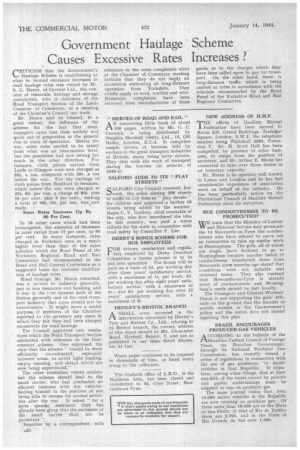Government Haulage Scheme Causes Excessive Rates Increases ?
Page 22

If you've noticed an error in this article please click here to report it so we can fix it.
rR1T1C1SII that the Government's
Haulage Scheme is contributing to what he termed excessive increases in road haulage rates was voiced by Mr. S. G. Hearn, of Carvers Ltd., the concern of removals, haulage and storage contractors, who is chairman of the Road Transport Section of the Leeds Chamber of Commerce, at a meeting of the Chamber's Council last week.
Mr. Hearn said he blamed, to a great extent, the influence of the scheme for the fact that roadtransport rates had risen unduly and quite out of proportion to the general rise in costs of operation. Before the war, some rates needed to be raised from what was an uneconomic level, but the pendulum' had now swung to much in the other direction. For instance, cloth pieces carried from Leeds to Glasgow were now charged at 85s. a ton, compared with 35s. a ton before the war. For the carriage of cloth pieces from Bradford to Swansea, which before the war were charged at 47s. 6d. per ton, a charge of 85s. plus 10 per cent. plus 5 per cent., making a total of 95s. 9d. per ton, wasinow made.
Some Rates Increases Up By 90 Per Cent.
In 16 other cases which had been investigated, the amounts of increases in rates varied from 12 per cent. to 90 per cent In many instances, rates charged in Yorkshire were at a much higher level than that of the rates schedule which the Road Panel of the Yorkshire Regional Road and Rail Committee had recommended to the Road and Rail Central Conference as a 'suggested basis for national stabilization of haulage rates.
Road haulage, Mr. Hearn remarked, was a service to industry generally, just as was insurance and banking, and it was in the hlst interest both of the Nation generally and of the road-transport industry that rates should not be extortionate. It might serve a useful purpose if members of the Chamber reported to the secretary any cases in which they felt they had been charged excessively for road haulage.
The Council approved two resolutions which the Road Transport Section submitted with reference to the Government scheme. One expressed the view that the scheme " should be More efficiently co-ordinated, especially between areas, to avoid light loading, empty running, and delays which are now being experienced.
The other resolution voiced anxiety lest the scheme should lead to the small carrier, who had zonducted an efficient business with few vehicles, finding himself in the position of not being able to resume his normal activi
ties after the war It asked " for a• more spec4c assurance than has afready been given that the exclusion of the small carrier shall not be permitted.'.'
Inquiries by a corresponcient, with A20
reference to the rates complaints aired at the Chamber of Commerce meeting indicate that they do not imply an accusation embracing all long-distance operation from Yorkshire. They chiefly apply to wool, textiles and wire. Numerous complaints have been received from manufacturers of these.
goods as to the charges which they have been called upon to pay for transport. On the other hand, there is long-distance traffic which is being carried at rates in accordance with the schedule recommended by the Road Panel of the Yorkshire Road and Rail Regional Committee.




















































